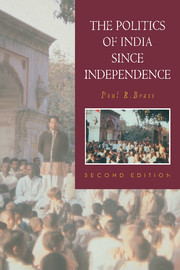Book contents
- Frontmatter
- Dedication
- CONTENTS
- List of figures and tables
- Preface
- List of abbreviations
- 1 Introduction: continuities and discontinuities between pre- and post-Independence India
- PART I POLITICAL CHANGE
- PART II PLURALISM AND NATIONAL INTEGRATION
- Introduction
- 5 Language problems
- 6 Crises of national unity: Punjab, the northeast, and Kashmir
- 7 Communal and caste conflict: secularism, Hindu nationalism, and the Indian state
- PART III POLITICAL ECONOMY
- Bibliography
- Index
Introduction
Published online by Cambridge University Press: 05 February 2015
- Frontmatter
- Dedication
- CONTENTS
- List of figures and tables
- Preface
- List of abbreviations
- 1 Introduction: continuities and discontinuities between pre- and post-Independence India
- PART I POLITICAL CHANGE
- PART II PLURALISM AND NATIONAL INTEGRATION
- Introduction
- 5 Language problems
- 6 Crises of national unity: Punjab, the northeast, and Kashmir
- 7 Communal and caste conflict: secularism, Hindu nationalism, and the Indian state
- PART III POLITICAL ECONOMY
- Bibliography
- Index
Summary
India's linguistic, religious, ethnic, and cultural diversities are proverbial. So are the political mobilizations and the violent conflicts and antagonisms which have arisen from time to time among and between persons from its distinctive cultural groups. However, it is important to note that neither political mobilization nor ethnic and cultural antagonisms flow naturally out of India's diversities. The 1971 Census of India enumerated thirty-three languages with speakers of more than one million, but only fifteen of them have achieved any form of significant political recognition.
The 1981 census enumerates a tribal population of more than fifty million persons divided into hundreds of distinct groups. Many political mobilizations have occurred among several of the tribal groups from the nineteenth century up to the present, of which a few have developed into bitter, violent, and secessionist movements directed against non-tribals, against particular state governments, or against the Government of India itself. On the other hand, many tribal groups have not mobilized and have not rebelled. Moreover, the forms which tribal mobilizations have taken have been diverse. Some have focused on economic grievances, have appeared to be class-based, and have drawn support from Marxist political organizations. Others have focused on political demands and have been organized and led by tribal leaders and exclusively tribal political organizations.
The whole modern history of India has been deeply affected and badly scarred by conflict between separatist Muslim political leaders and organizations and the Indian National Congress and by continuing Hindu-Muslim riots and pogroms against Muslim minorities in some cities and towns. Even with respect to these conflicts and the associated violence, however, they must be contrasted against periods of Hindu-Muslim cooperation. Moreover, it must be noted and needs to be explained why such conflicts have occurred more intensely in some parts of the country and have been less intense or non-existent in others where Hindus and Muslims also live side by side.
- Type
- Chapter
- Information
- The Politics of India since Independence , pp. 151 - 156Publisher: Cambridge University PressPrint publication year: 1994



